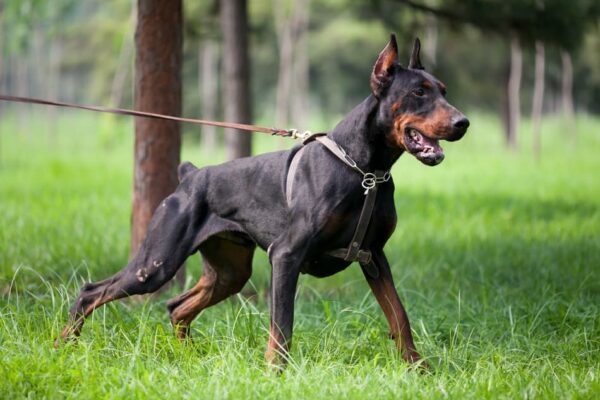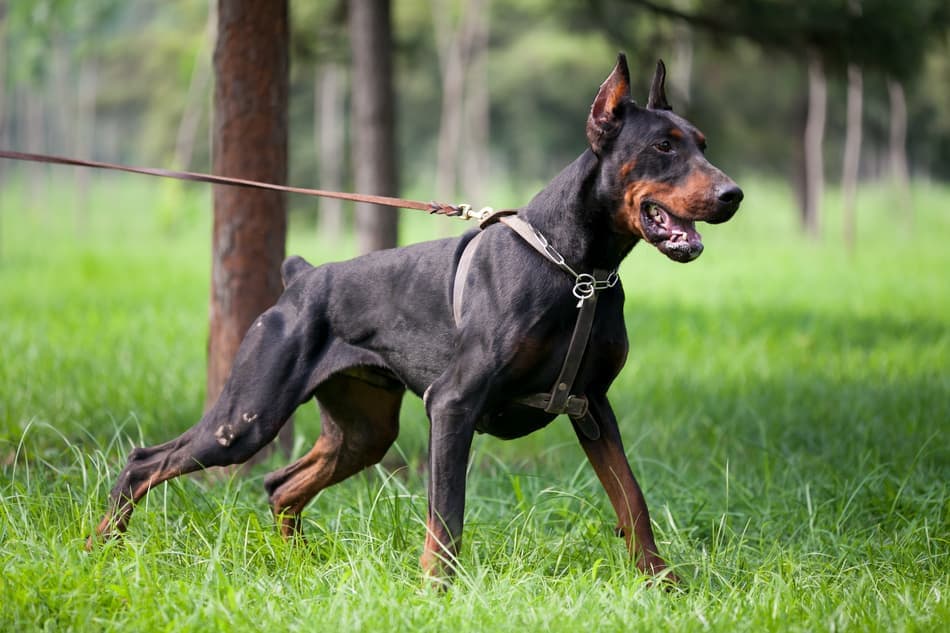Doberman Pinscher – The Elegant, Loyal, and Fearless Guardian
Doberman Pinschers are known for their sleek appearance, intelligence, and unwavering loyalty. Renowned as vigilant protectors and graceful companions, Dobermans combine elegance with power. This comprehensive article explores the breed’s rich history, detailed physical characteristics—including size, weight, and life expectancy—temperament, care requirements, and common health considerations.

1. History and Origins
The Doberman Pinscher was developed in Germany in the late 19th century by Karl Friedrich Louis Dobermann, a tax collector who sought a loyal and fearless guard dog. Dobermann combined several breeds—such as the Rottweiler, German Pinscher, and Weimaraner—to create a versatile working dog with speed, endurance, and intelligence.
Originally used for personal protection and police work, Dobermans quickly gained recognition for their ability to balance strength with elegance. Their keen senses and loyalty helped them excel in guard and protection roles, while their striking appearance captured the attention of dog enthusiasts worldwide. Today, Dobermans serve not only as working dogs but also as loving family companions, excelling in obedience, protection sports, and competitive dog shows.
2. Physical Characteristics, Size, and Lifespan
Doberman Pinschers are medium-to-large dogs known for their athletic, streamlined build that exudes power and grace. Their physical features are carefully balanced to support their roles as both protectors and agile athletes.
Key Physical Features:
- Head and Face: Dobermans have a long, chiseled head with a defined stop and expressive, almond-shaped eyes that radiate intelligence and alertness. Their ears are often cropped (where legal) to enhance their formidable appearance.
- Coat: They possess a short, sleek coat that lies close to the body, typically in colors such as black, blue, red, or fawn with rust markings. Their low-maintenance coat contributes to their neat and sophisticated look.
- Body Structure: With a deep chest, muscular limbs, and a lean, powerful frame, Dobermans are built for agility and speed. Their balanced physique allows them to perform demanding tasks with both precision and endurance.
Detailed Measurements:
- Height: Dobermans typically stand between 24 to 28 inches (61 to 71 cm) at the shoulder, with males generally being larger.
- Weight: They usually weigh between 60 to 100 pounds (27 to 45 kg), depending on gender, genetics, and overall build.
- Life Expectancy: With proper care, Doberman Pinschers generally live between 10 to 13 years. Their lifespan can be influenced by genetics, exercise, diet, and proactive health management.
These physical attributes not only define the Doberman’s elegant and powerful appearance but also support their performance in protection, obedience, and competitive sports.
3. Personality and Temperament
Doberman Pinschers are celebrated for their loyalty, intelligence, and fearless nature. Their temperament makes them excellent working dogs and devoted family companions.
- Loyal and Protective: Dobermans are renowned for their strong loyalty to their families. They are naturally protective, making them exceptional guard dogs who remain calm and focused in various situations.
- Intelligent and Alert: Their high intelligence and quick learning ability allow them to excel in training. They are known for their responsiveness and can quickly learn complex commands and tasks.
- Energetic and Agile: As athletic dogs, Dobermans thrive on regular physical exercise and mental challenges. Their energy is best channeled through active play, rigorous training, and engaging activities.
- Confident and Fearless: Dobermans exude confidence and are not easily intimidated. Their assertive yet controlled demeanor makes them reliable protectors and effective working dogs.
- Affectionate Companions: While they have a strong protective instinct, Dobermans are also gentle and affectionate with their families. With proper socialization, they are known to be excellent with children and can adapt well to different living environments.
Their balanced personality—combining courage, intelligence, and affection—ensures that Doberman Pinschers are both formidable guardians and loving family members.
4. Care and Training
4.1. Nutrition and Feeding
A balanced diet is crucial to maintaining the health, energy, and performance of a Doberman Pinscher:
- High-Quality Diet: Select premium dog food that is rich in high-quality proteins, healthy fats, and essential nutrients. Diets formulated for active, large-breed dogs work best.
- Portion Control: Monitor their food intake carefully to avoid obesity. Adjust portions based on the dog’s age, activity level, and metabolism.
- Regular Feeding Schedule: Establish consistent feeding times to support healthy digestion and energy levels. Consult your veterinarian for personalized dietary recommendations.
4.2. Exercise and Physical Activity
Due to their high energy and athletic build, Dobermans require regular physical and mental stimulation:
- Daily Exercise: Aim for at least 60 minutes to 90 minutes of exercise per day. Activities such as brisk walks, running, and interactive play sessions help maintain muscle tone and overall fitness.
- Mental Stimulation: Engage their sharp minds with puzzle toys, advanced obedience training, and agility courses. Mental challenges prevent boredom and keep them alert.
- Social and Controlled Environments: Provide opportunities for safe socialization with other dogs and people. Regular interaction and varied activities ensure that their protective instincts are balanced with friendly behavior.
4.3. Training and Socialization
Early and consistent training is essential for harnessing the Doberman’s potential:
- Positive Reinforcement: Use treats, praise, and play as rewards to encourage good behavior. Their intelligent nature responds well to positive reinforcement techniques.
- Obedience Training: Consider enrolling in professional obedience classes to reinforce basic commands and improve discipline. Training helps channel their protective instincts constructively.
- Early Socialization: Expose your Doberman to diverse people, environments, and other animals from a young age. Early socialization helps prevent over-protectiveness and ensures they grow into well-adjusted, confident adults.
- Consistency and Patience: Maintaining consistent rules and training routines is key, as Dobermans thrive on clear expectations and firm, loving guidance.
5. Health Considerations
While generally healthy, Doberman Pinschers can be prone to specific health issues. Proactive care and regular veterinary check-ups are essential:
- Cardiac Issues: Dobermans are known to have a predisposition to heart conditions such as dilated cardiomyopathy. Regular heart screenings and a balanced diet can help mitigate these risks.
- Musculoskeletal Problems: Joint issues or muscle injuries can occur in active dogs. Ensuring proper exercise, weight management, and joint supplements can help maintain overall mobility.
- Von Willebrand’s Disease: This inherited blood clotting disorder can affect Dobermans. Routine blood tests and early diagnosis are important for management.
- Hypothyroidism: Some Dobermans may develop thyroid imbalances. Regular veterinary exams and blood tests can help detect and treat this condition early.
- General Preventive Care: Consistent veterinary visits, vaccinations, dental care, and parasite prevention contribute to a long, healthy life.
6. The Role of the Doberman Pinscher in Society
Dobermans have a storied legacy as both working dogs and family companions:
- Guardians and Protectors: Their natural protective instincts and alert nature make Dobermans excellent guard dogs, safeguarding homes and families.
- Working and Service Dogs: Their intelligence and trainability have allowed many to excel in roles such as police, military, and search and rescue work.
- Competitive Sports: Dobermans are prominent in obedience, agility, and protection sports, where their athleticism and discipline are showcased.
- Loving Family Companions: With proper socialization and training, Dobermans can be gentle, affectionate, and trustworthy pets for families, forming deep bonds with their owners.
Their versatility and loyalty underscore the Doberman Pinscher’s enduring appeal, making them a popular choice for individuals and families alike.
7. Conclusion
The Doberman Pinscher is a breed that epitomizes elegance, strength, and unwavering loyalty. With a rich history as fearless protectors and a striking physical presence—standing between 24 to 28 inches tall, weighing 60 to 100 pounds, and boasting a life expectancy of 10 to 13 years—Dobermans offer an ideal combination of power, intelligence, and affectionate companionship.
For anyone seeking a dog that serves as both a capable guardian and a devoted family companion, the Doberman Pinscher is an excellent choice. With proper nutrition, regular exercise, consistent training, and proactive health care, a Doberman can enrich your life with loyalty, protection, and a touch of refined elegance.


